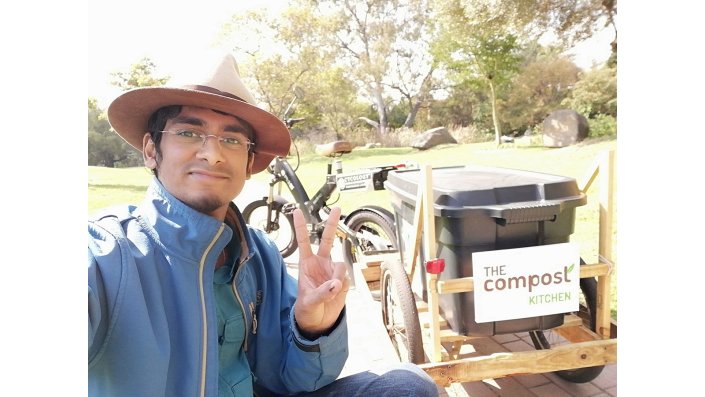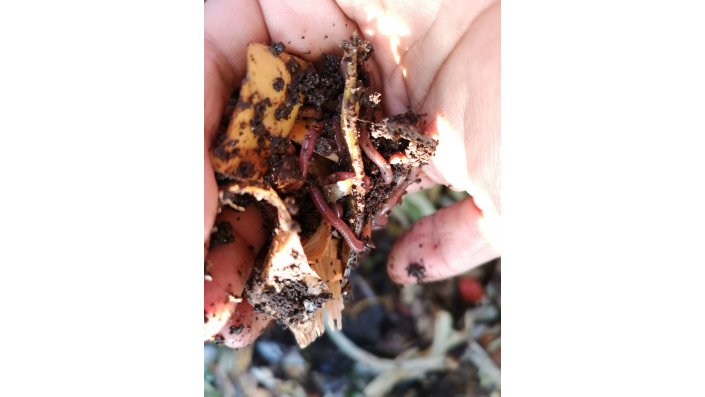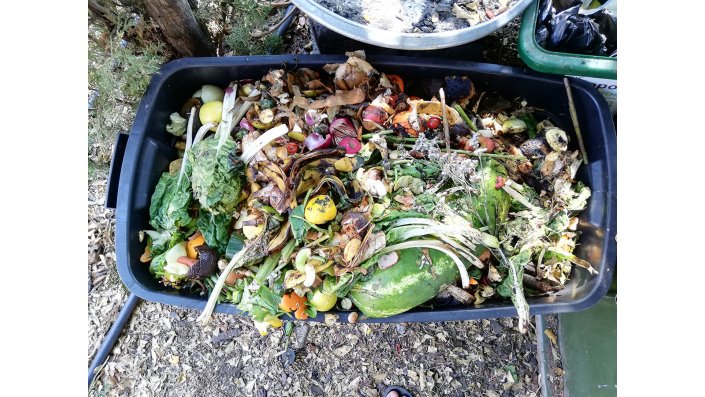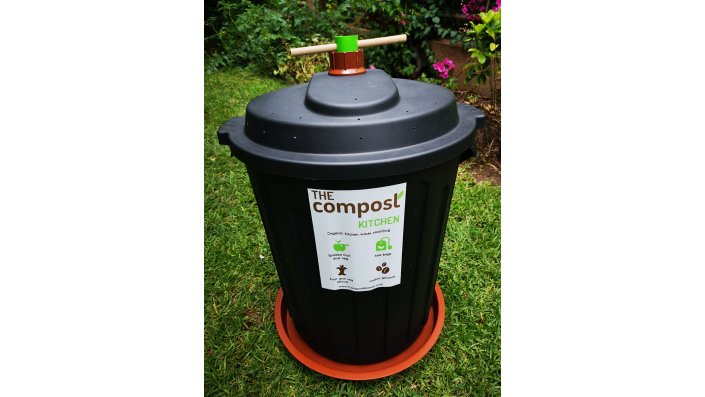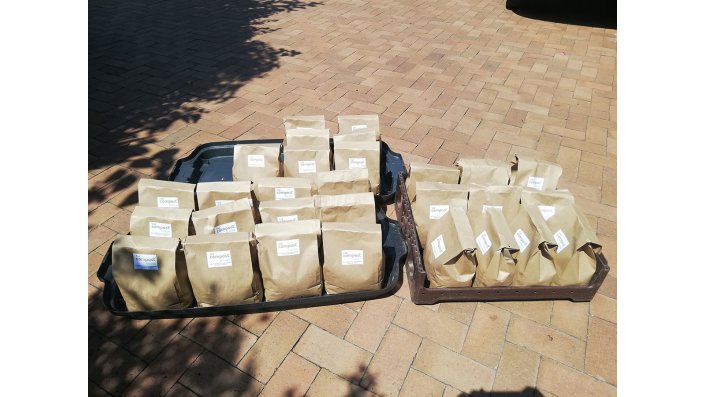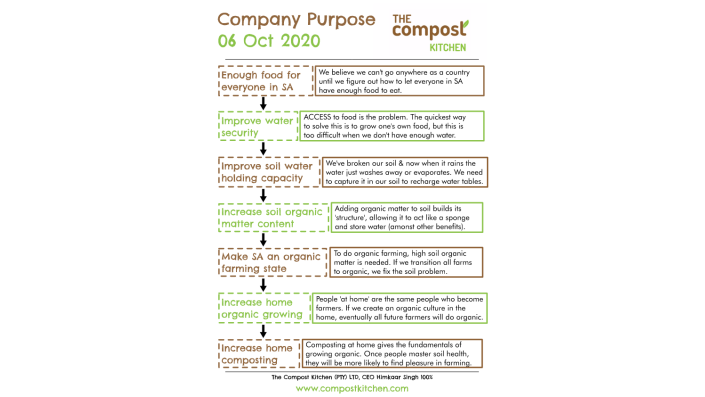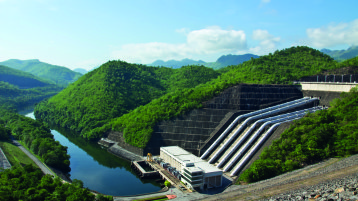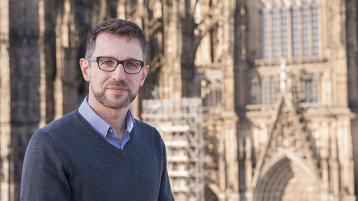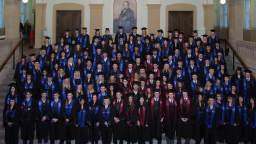Himkaar Singh – Mit Erde helfen, die Welt zu retten
Kann man Umweltschutz so gestalten, dass alle, die mitmachen, auch direkt davon profitieren? Himkaar Singh, Alumnus des Instituts für Technologie und Ressourcenmanagement in den Tropen und Subtropen (ITT), hat genau diese Vision. Mit der Gründung der „Compost Kitchen“ setzt er sie in seiner Heimat Südafrika in die Tat um: Aus bislang ungenutztem Biomüll macht er fruchtbare Erde.
Himkaar Singh wuchs in Johannesburg und Kapstadt auf und arbeitete nach seinem Abschluss an der Universität von Witwatersrand bereits als Bauingenieur für renommierte Firmen. Dabei erhielt er einen Einblick in wichtige Infrastrukturprojekte im Straßenbau und der Wasserwirtschaft. Im Jahr 2015 brach in Südafrika eine nie gekannte Dürre aus, die schwere wirtschaftliche Folgen hatte und auch die Wasserversorgung von Kapstadt bedrohte. Himkaar Singh war frustriert über die Situation. Er beschloss, aus seinem Job auszusteigen und Südafrika zu verlassen: „Ich wollte nicht vor den Problemen flüchten, sondern mit Lösungen wiederkommen.“ Dazu schrieb er sich für den Masterstudiengang „Integrated Water Resources Management“ am ITT ein, der in englischer Sprache angeboten wird und die Herausforderungen des stetigen Bevölkerungs- und Wirtschaftswachstum sowie des Klimawandels auf die Wasserwirtschaft zum Inhalt hat.
Bildergalerie
So global wie das Thema war auch die Studierendenschaft: Im Jahrgang von Himkaar Singh waren Studierende aus 39 Ländern eingeschrieben. Ein Semester verbrachte er an der Partneruniversität in Jordanien, ein weiterer Aufenthalt im Rahmen des Studiums führte ihn nach Vietnam. Und überall eignete er sich neues Wissen an: „In Deutschland habe ich gelernt, dass ein System der Mülltrennung funktioniert. In Vietnam sah ich, wie stark Müll die Wasserwirtschaft beeinflusst. Und in Jordanien wurde mir bewusst, wie eng die Bodenbeschaffenheit mit dem Wasserkreislauf zusammenhängt.“ Wie in einem Puzzle setze Himkaar Singh sein weltweit erworbenes Wissen zusammen und erarbeitete eine maßgeschneiderte Lösung für sein Heimatland.
Das Ergebnis ist die in Johannesburg angesiedelte Firma „Compost Kitchen“: Das Geschäftsmodell: Die Kunden zahlen einen geringen Betrag und sammeln ihren Biomüll in Tonnen, die das Unternehmen regelmäßig abholt. Aus dem organischen Abfall, der hier eben kein Müll, sondern wertvoller Rohstoff ist, machen Kompostwürmer allerbesten Wurmhumus, von dem jeder Kunde monatlich einige Kilogramm bekommt. Das reduziert die Müllmenge und entlastet die Deponien und verbessert nicht zuletzt die Fähigkeit des Bodens, Wasser aufzunehmen und zu speichern. „Das Umweltbewusstsein – vor allem bei den Jüngeren – ist in Südafrika vorhanden“, erklärt Himkaar Singh. „Was fehlt, sind allerdings Möglichkeiten, das Bewusstsein in Handeln umzusetzen.“ Hier bietet die „Compost Kitchen“ eine Lösung, die viele weitere Aspekte umfasst – beispielsweise die verringerte Abhängigkeit durch eine Selbstversorgung aus dem eigenen Garten. „Mit meiner Firma möchte ich aber auch ein Beispiel geben, um zu zeigen, dass Umweltschutz und Business Hand in Hand gehen können“, sagt Himkaar Singh.
Seine Geschäftsidee wurde von der irischen Umweltschutz-Organisation „Fifty Shades greener“ im Jahr 2021 ausgezeichnet. Es war die ganz auf Nachhaltigkeit basierende Geschäftsidee, die die Jury überzeugte. Auch das „Branson Centre of Entrepreneurship“ des englischen Milliardärs Richard Branson unterstützt das Unternehmen. Und so sorgt der Weltbürger Himkaar Singh dafür, dass die (Um-)Welt im Kleinen und hoffentlich im Großen etwas besser wird.
Himkaar Singh – Saving the world with soil (English Version)
Is there a way to protect our planet and have everyone involved benefit from it? Yes, there is, says Himkaar Singh, alumnus of the Institute for Technology and Resources Management in the Tropics and Subtropics (ITT). He founded the recycling business The Compost Kitchen in his home country South Africa and made his vision a reality. He turns unused organic household waste into fertile soil and solves several problems at a time.
Himkaar Singh grew up in Johannesburg and Cape Town. After graduating from the University of the Witwatersrand, he worked as a civil engineer at several renowned corporates and gained insight into major infrastructure projects in road construction and water management. In 2015, South Africa experienced an unprecedented drought with severe consequences for the economy and the water supply of the capital Cape Town. Himkaar Singh was very frustrated by the situation. He decided to quit his job and leave South Africa. “I didn’t leave my country to avoid the problem, but to come back with a solution,” he says. Which is why he enrolled in the English master‘s program “Integrated Water Resources Management“ at the ITT where he learned about the ever-growing challenges of overpopulation and economic growth and the impact climate change has on our water resources worldwide.
A master’s program with an international approach – and an international student body. Himkaar Singh's year included students from 39 countries around the world. He spent one semester at the partner university in Jordan and another one in Vietnam. And learned something new wherever he went. “In Germany, I learned that having a waste separation system works. In Vietnam, I saw the impact that waste has on water management. And in Jordan, I realized that the condition of the soil and the water cycle are closely connected.” Like with a jigsaw puzzle, Himkaar Singh put together all the pieces of knowledge he had acquired and came up with a solution for his home country.
The result: His Johannesburg-based company The Compost Kitchen whose customers collect their food waste, put it in special bins and pay a small fee to the company for regular waste collection. Their organic waste, which is actually not waste but a precious natural resource, is then turned into high-quality vermicompost by earthworms and given back to them. That way, the company can reduce the total amount of waste and the burden on landfill sites, giving households the possibility to grow their own organic fruit and vegetables at the same time. Plus, the produced soil can absorb and store water a lot more efficiently. “People in South Africa, especially the younger ones, want to go green,” explains Himkaar Singh.“ But they lack opportunities to put their ecological awareness into practice.” The Compost Kitchen provides them with a solution that encompasses many other aspects. For example, by growing their own food in their own garden they are less dependent on traditional food sources. “With my company, I also want to set an example and show that a profitable business and environmental protection can go hand in hand,” says Himkaar Singh.
Not only has the idea received a lot of attention but it has also already won a number of awards. The Irish environmental protection organization “Fifty Shades Greener” selected The Compost Kitchen as one of three winners in 2021. The jury was especially convinced by the company‘s very sustainable business idea. The “Branson Centre of Entrepreneurship“ of the English billionaire Richard Branson also supports the company. And that‘s how Himkaar Singh is trying to make the world a better place.
Mai 2021

